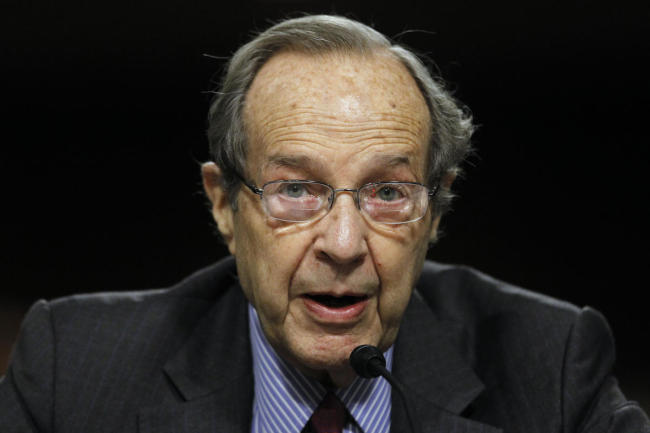‘Normalization of relations with N. Korea essential in denuclearization’: Perry
By Ock Hyun-juPublished : April 10, 2018 - 17:16
South Korea and the US normalizing relations with North Korea is critical to achieving denuclearization, former US Secretary of Defense William J. Perry said Tuesday.
Perry, who helped defuse the 1994 North Korean nuclear crisis, says North Korea views its nuclear arsenal as “the only sure way” to deter the US from overthrowing its regime, and that the South and the US should address its security concerns.
“I believe that normalization is essential in achieving denuclearization,” he said during a press briefing on the sidelines of the seventh Seoul Economic Forum. “They go together hand in hand.”
“Along with specific agreements made between South Korea and North Korea, and between North Korea and the US, there needs to be an agreement on how to get this process of normalization moving forward,” he said.
Perry, who helped defuse the 1994 North Korean nuclear crisis, says North Korea views its nuclear arsenal as “the only sure way” to deter the US from overthrowing its regime, and that the South and the US should address its security concerns.
“I believe that normalization is essential in achieving denuclearization,” he said during a press briefing on the sidelines of the seventh Seoul Economic Forum. “They go together hand in hand.”
“Along with specific agreements made between South Korea and North Korea, and between North Korea and the US, there needs to be an agreement on how to get this process of normalization moving forward,” he said.

Normalizing relations with North Korea is critical in making sure that the North dismantles its nuclear and missile programs, he said, as verification of nuclear disarmament is technically very difficult and needs cooperation from the reclusive regime.
“That will create an environment where it will be easier to inspect and have more confidence in results of the inspection,” he said.
Perry, who served as the defense secretary from 1994 to1997, is one of few senior US officials to have negotiated directly with North Koreans. He is well-known for the “Perry Process,” a three-stage proposal he drew up in 1999. It suggests North Korea freeze its missile tests and development, and the US normalize its relations with the North.
In a surprising breakthrough following a year of exchanging insults and hostilities, North Korea and the US are planning to sit down for talks in May or early June to discuss the North’s nuclear weapons programs. An inter-Korean summit is scheduled for April 27.
As for the prospects of the upcoming historic summit between Pyongyang and Washington, Perry said he is hopeful, but noted that South Korea and the US should be aware that they all have different expectations entering into negotiations with the North.
“Success of the upcoming summit depends on understanding how difficult and complex the issues are, understanding it’s going to take some time to get the result and understanding we are going into this with different expectations,” he said.
Questions remain as to whether the US and North Korea will define denuclearization in the same way.
The US has been clear that it wants the North to dismantle its nuclear weapons programs in a complete, verifiable and irreversible manner before it gives any incentives -- such as sanctions relief -- to the North.
North Korea, on the other hand, said it would denuclearize when its security is guaranteed and hostile policy toward the country is removed. It later also said that it would denuclearize step-by-step in accordance with Seoul and Washington’s “progressive and synchronous” measures.
Perry said that agreeing on a ban on North Korea’s nuclear and missile tests and any transfer of related technologies would be the first step toward the North’s denuclearization.
Stressing that the North Korean nuclear crisis will not be resolved overnight through the upcoming talks with the communist state, he said the countries involved should lower their expectations.
“We should not expect instant results of the summits. The best we can hope for (through the summits) is to set up a process for denuclearization,” he said, saying it will be a "slow process."
Amid concerns that the failure of the upcoming US-North Korea summit could lead Washington to consider using a military option against Pyongyang, Perry warned that military action could escalate into a nuclear war.
“We should resolve this issue through peaceful means, not though military action, and I believe that can be done," he said. "This is time for serious, constructive diplomacy."
By Ock Hyun-ju (laeticia.ock@heraldcorp.com)
-
Articles by Ock Hyun-ju








![[Graphic News] More Koreans say they plan long-distance trips this year](http://res.heraldm.com/phpwas/restmb_idxmake.php?idx=644&simg=/content/image/2024/04/17/20240417050828_0.gif&u=)
![[KH Explains] Hyundai's full hybrid edge to pay off amid slow transition to pure EVs](http://res.heraldm.com/phpwas/restmb_idxmake.php?idx=644&simg=/content/image/2024/04/18/20240418050645_0.jpg&u=20240419100350)






![[From the Scene] Monks, Buddhists hail return of remains of Buddhas](http://res.heraldm.com/phpwas/restmb_idxmake.php?idx=652&simg=/content/image/2024/04/19/20240419050617_0.jpg&u=20240419175937)

![[KH Explains] Hyundai's full hybrid edge to pay off amid slow transition to pure EVs](http://res.heraldm.com/phpwas/restmb_idxmake.php?idx=652&simg=/content/image/2024/04/18/20240418050645_0.jpg&u=20240419100350)

![[Today’s K-pop] Illit drops debut single remix](http://res.heraldm.com/phpwas/restmb_idxmake.php?idx=642&simg=/content/image/2024/04/19/20240419050612_0.jpg&u=)